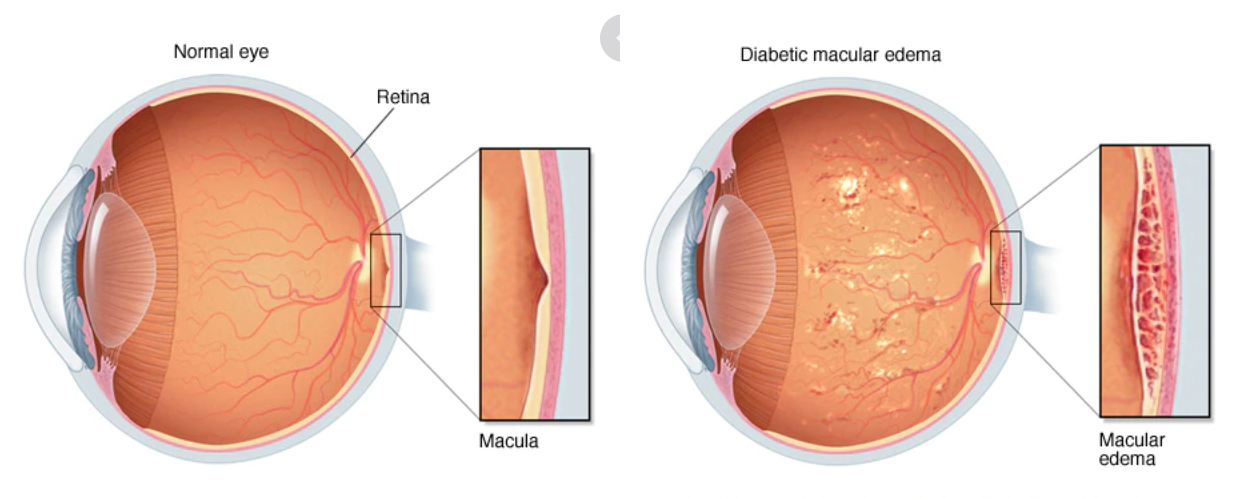Diabetic Macular Edema Treatment in Panipat | Gupta Eye Hospital

Best Eye Doctor in Panipat | Dr. Kanav Gupta
April 18, 2022
Age-Related Macular Degeneration Explained in Hindi
April 20, 2022Diabetic Macular Edema Treatment in Panipat | Gupta Eye Hospital
- Ankh ke pardey ka ilaaz panipat me
- Diabetic Macular Edema Treatment In Panipat
- Dr. Kanav Gupta
- Dr. Kanav Gupta - Eye Specialist
- Dr. Kanav Gupta Ophthalmologist in Panipat
- Retina Diseases
- Retina Doctors in Panipat
- Retina problem treatment in Panipat
- Retina Problems
- Retina Specialist in Panipat
- Retina Surgeon in Panipat
- Retina Surgery in Panipat
- Retina Treatments
- Retina Treatments in Panipat
- Retinal Deatachment Treatment in Panipat
- Vitreoretina Services in Panipat

Diabetic Macular Edema Treatment In Panipat | Gupta Eye Hospital - Panipat


Normal Vision

You may not notice early changes of diabetic macular edema, but your doctor may be able to detect it.

You may not notice early changes of diabetic macular edema, but your doctor may be able to detect it.
What is Diabetic Macular Edema?
Diabetic macular edema (DME) is a complication of diabetes. People with type 1 or type 2 diabetes can develop DME.
DME occurs when excess fluid starts to build up in the macula of the eye. The macula allows us to focus and see fine details. It’s located in the center of the retina, the lining at the back of the eye that’s full of blood vessels.
When excess fluid builds up in the macula, it causes vision problems.
DME generally develops over time. High blood sugar levels can damage the blood vessels in the retina. Damaged blood vessels can leak fluid, which causes swelling and other issues. This damage is called retinopathy.
There are several treatment options for DME. It’s easiest to treat when diagnosed early and monitored regularly by an eye care doctor.

Causes Behid Diabetic Macular Edema
DME starts when your blood sugar isn't well controlled. Consistently high blood sugar harms blood vessels throughout your body, like in your heart, as well as the small blood vessels in your retina -- the tissue at the back of your eye that sends images to your brain.
Without healthy blood vessels, your retina can't work the way it's supposed to.
Your body tries to help out by making more of a protein called vascular endothelial growth factor, or VEGF. In a healthy eye, this is not a problem. But in some conditions, too much of it weakens those blood vessels. In time, they can tear and leak blood and fluid into your retina. Your retina will swell and get thicker, a condition called diabetic retinopathy. The leaking fluid also causes swelling in the macula, the place in the center of the retina that gives you sharp, clear vision.
"Edema" is a medical word for swelling from extra fluid. So DME is a fluid buildup that makes your macula swollen because of diabetes.
Diabetes is the main cause of macular edema. But it can happen for other reasons, too, including cataract surgery or other operations on your eyes, macular degeneration, swelling in the uvea (the middle part of your eye), and blocked veins in your retina or damage from radiation.
Some medicines for diabetes, cancer, and multiple sclerosis can cause macular edema.

Symptoms of DME
In its early stages, there may be no symptoms. If you have diabetes, it’s important to see an eye care doctor every year so they can examine your eyes for any changes. If there’s any sign of retinopathy or DME, early treatment can prevent or restore vision loss.
Make sure to tell your eye care doctor if you have any of the following symptoms:- blurry vision
- seeing colors that look washed out
- seeing more floaters in your vision
- double vision
Types of Diabetic Macular Edema (DME)
- Focal DME is small spots of fluid leaking
- Diffuse DME has leaks and swelling throughout your macula
Eye tests to screen Diabetic Macular Edema
- Optical Coherence Tomography (OCT): This test measures any swelling in the retina.
- Fundus Imaging: This test takes detailed pictures of the retina to look for irregular blood vessels.
- Fluorescein Angiography: For this test, dye is injected into your arm or hand to highlight the blood flow in the retina.
How to prevent?
It’s never too late to discuss treatment options with your doctor. If you’ve received a diagnosis of DME, starting treatment quickly can help prevent long-term eye damage and vision loss.
Taking preventive action can make a big difference when it comes to protecting your vision. Help take care of your eyes by doing the following:
- See your eye care doctor for annual checkups.
- Contact your eye care doctor as soon as you notice any vision changes.
- Work with your diabetes care team to manage your blood sugar levels effectively.
- Take steps to keep your blood pressure and cholesterol levels in target.



